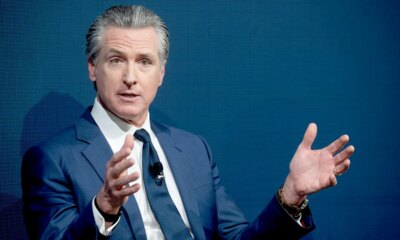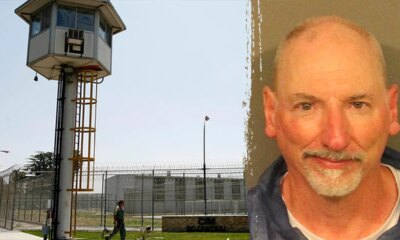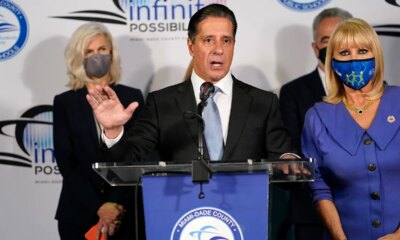Education
California Historical Society to Dissolve and Transfer Collections to Stanford

The California Historical Society, facing longstanding financial challenges exacerbated by the coronavirus pandemic, has decided to dissolve and transfer its collections to Stanford University.
The society, a private nonprofit organization established in 1871 and designated the state’s official historical society in 1979, is one of California’s oldest historical organizations. But unusually among state historical societies, its leadership said, it received no regular state funding, which left if vulnerable to the vagaries of private donations.
Tony Gonzalez, the organization’s board chair, said the decision to dissolve the organization, which is headquartered in San Francisco, was “bittersweet.” But he emphasized that the arrangement with Stanford ensured that the society’s collections, which include more than 600,000 items stretching back a century before the Gold Rush, would remain intact and accessible to the public.
“We think of it as a rebirth,” Gonzalez said. “Stanford will not be a state historical society, but the collection will be in better hands with them than it could be with us.”
The society’s treasures include the Kemble Collections on Western Printing and Publishing, which features books, pamphlets, product labels, trade catalogs and other items produced in the American West between 1802 and 2001. The society also holds the archives of many organizations, like the American Civil Liberties Union of Northern California and the California Flower Market, Inc., founded by Japanese American flower merchants in 1912.
It is also the official repository for records relating to the People’s Temple, whose members, led by Jim Jones, drank poison in Guyana in 1978, leading to the death of more than 900 people, a third of them children.
Anh Ly, Stanford’s assistant university librarian for external relations, called the historical society’s collection a “huge addition” to its own holdings of more than 15 million items, which would help fill in some gaps, particularly relating to California’s early history.
The board’s decision to dissolve the society and transfer its collection follows a decade of failed attempts at a turnaround.
In 2016, it was tapped by the city of San Francisco as its lead partner for a potential restoration of the Old United States Mint in downtown San Francisco, one of the few structures to survive the 1906 earthquake and fire. But restoration of the building, which had been largely unused for decades, was deemed prohibitively expensive.
In early 2020, the group announced a new strategic plan that involved selling its 20,000-square-foot building near Union Square and using the proceeds to support traveling shows and partnerships with smaller organizations around the state. But that effort was thwarted by the pandemic and downturn in San Francisco’s real estate market, as well as the unexpected death in 2022 of Alicia L. Goehring, the executive director and chief executive who helped formulate the plan.
Gonzalez, a Sacramento lawyer who joined the board in 2012, said that private philanthropic support had become unreliable over the past two decades, as many foundations and donors pivoted away from the humanities toward efforts more directly aimed at solving social problems. And unlike in other states with robust historical societies, he said, California’s legislature had never provided any regular appropriation for operational support.
In 2022, Gonzalez said, the group requested a one-time grant of $12 million to support a partnership with the University of California, Riverside, which would have involved collaborating with Native American tribes to bring historical projects to underserved parts of the state.
The request was rejected. “The legislature gave us the same answer we heard from philanthropic organizations: This sounds like something a university should be doing,” Gonzalez said.
The group took out a $5 million loan against its building, to help cover its budget, which Jen Whitley, the group’s interim executive director, said was about $3.5 million.
But finances remained unworkable, and last summer the board voted to begin the process of dissolution. Four years after it was first listed, its building — a former hardware store painted the same shade of red as the Golden Gate Bridge — was sold for nearly $6.7 million, according to The San Francisco Chronicle.
Under terms of dissolution, which had to be approved by the state attorney general, Stanford will also receive the society’s endowment of roughly $3.2 million. While most of the staff of roughly two dozen have been let go over the past several years, Whitley said, three people will move to Stanford with the collection.
Gonzalez said it was “painful” to see history lose a footprint in San Francisco, at a moment when many of the city’s history and preservation groups are struggling to stay afloat. But Stanford’s stewardship of the collection, he said, would allow the continual discovery of new stories about the past.
He cited the example of Juana Briones, a businesswoman and healer born in 1802 in Santa Cruz who lived in California “under three flags”: Spanish, Mexican and American. In 2011, local preservationists helped save a portion of adobe wall from her home in Palo Alto, which became the centerpiece of a bilingual exhibition at the historical society.
“We all know about the Gold Rush,” Gonzalez said. “But there are also all these unsung heroes.”

Education
After F.B.I. Raid, Los Angeles School Board Discusses Superintendent
Board members are having an emergency meeting a day after agents raided the home and office of Alberto Carvalho, the Los Angeles Unified School District superintendent. The F.B.I. also searched the Florida home of a consultant with ties to the schools chief.
Education
How A.I.-Generated Videos Are Distorting Your Child’s YouTube Feed
Experts caution that low-quality, A.I.-generated videos on YouTube geared toward children often feature conflicting information, lack plot structure and can be cognitively overwhelming — all of which could affect young children’s development.
Education
Video: Blizzard Slams Northeast with Heavy Snow, Disrupting Travel

new video loaded: Blizzard Slams Northeast with Heavy Snow, Disrupting Travel
transcript
transcript
Blizzard Slams Northeast with Heavy Snow, Disrupting Travel
Several cities across the Northeast received at least two feet of snow, bringing many places to a standstill.
-
“I hope our students enjoy their snow day today and stay warm and safe throughout, but I do have some tough news to share. School will be in-person tomorrow. You can still pelt me with snowballs when you see me.” “It’s probably about the worst I’ve seen. I mean, I was here with the last big storm. I think that was where in 2016 or something. But it wasn’t as bad as this. And the problem is, when the plows come past, they just throw up all the snow. And there’s going to be a big bank here later. So I’m digging it out now to get rid of some of this.” “I do ski patrol on the Lower East Side. I like to check the parks, and sometimes I find people fall in the snow and they can’t get up, like a elderly gentleman went out in his pajamas to get a quart of milk. So, things like that.” “And if you can cook at home, please do so instead of ordering food to be delivered given the conditions. Make an enormous pot of soup and bring some to your neighbors upstairs.”

By Meg Felling
February 23, 2026
-

 World4 days ago
World4 days agoExclusive: DeepSeek withholds latest AI model from US chipmakers including Nvidia, sources say
-

 Massachusetts4 days ago
Massachusetts4 days agoMother and daughter injured in Taunton house explosion
-

 Montana1 week ago
Montana1 week ago2026 MHSA Montana Wrestling State Championship Brackets And Results – FloWrestling
-

 Denver, CO4 days ago
Denver, CO4 days ago10 acres charred, 5 injured in Thornton grass fire, evacuation orders lifted
-

 Louisiana7 days ago
Louisiana7 days agoWildfire near Gum Swamp Road in Livingston Parish now under control; more than 200 acres burned
-

 Technology1 week ago
Technology1 week agoYouTube TV billing scam emails are hitting inboxes
-

 Technology1 week ago
Technology1 week agoStellantis is in a crisis of its own making
-

 Politics1 week ago
Politics1 week agoOpenAI didn’t contact police despite employees flagging mass shooter’s concerning chatbot interactions: REPORT
























